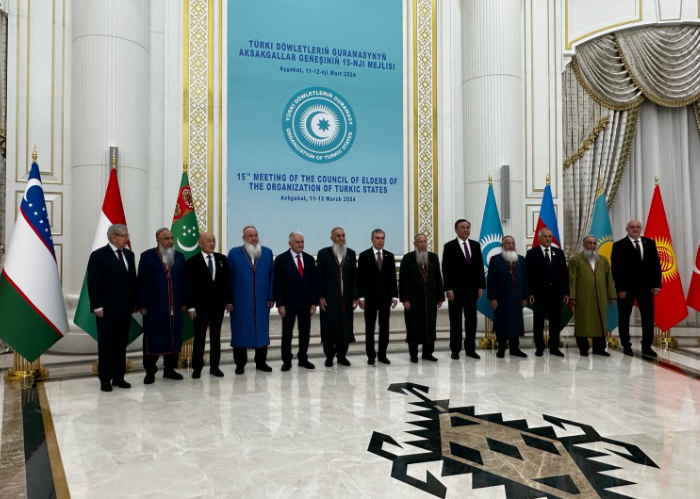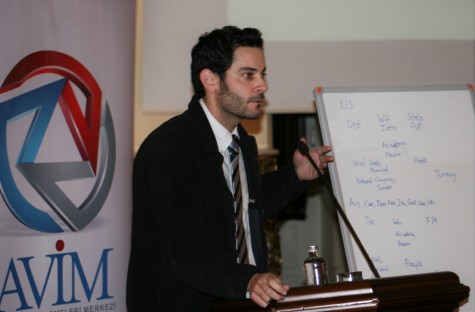
Berna SARICA*
Dr. Teoman Ertuğrul TULUN**
I. Introduction
As demographic changes redefine the fabric of Turkic societies, the question of how to protect and empower the region’s elderly emerges as both a challenge and an opportunity for forward-looking policy. Recent analysis has underscored the urgency of action and the value of regionally grounded solutions anchored in distinctive historical institutions. This blog now turns attention to how mechanisms like the Council of Elders, rooted in local tradition yet responsive to evolving needs, can guide the next phase in constructing a credible and inclusive regional framework for elderly rights. By focusing on institutional capacity and the creative adaptation of cultural models, the discussion opens a pathway for policymakers and scholars to consider new, pragmatic avenues, laying the groundwork for a broader, empirical exploration of policy innovation in the Turkic Eurasian context.
II. The Role of the Council of Elders (aksakal) and OTS Institutional Culture
The Council of Elders, or aksakallar konseyi, has been a pivotal institution in the organizational and cultural history of the Turkic world. Traditionally, aksakals served as wise, senior advisors and mediators, embodying communal memory and authority in resolving disputes and guiding communal decision-making. The Organization of Turkic States (OTS) has formalized this tradition within its institutional architecture, transforming the aksakal council into a consultative body composed of respected figures from each member country.[1] The Council's remit now extends beyond arbitration: it is charged with advancing unity, cultural continuity, and adaptive policy dialogue among member states.[2]
Legitimacy and intergenerational trust are central to the council's function. By drawing from elders who command longstanding respect due to their service, knowledge, and moral standing, OTS strengthens the acceptance and resonance of its initiatives among diverse publics.[3] The council’s regular meetings and summit appearances highlight its utility in the smooth transmission of norms, such as solidarity, social care, and collective memory,across institutions, generations, and state borders. As recently underscored in the 18th Meeting of the Council of Elders in Baku, the council’s advice informs not only regional cultural projects but also emerging debates on social policy, including those related to the rights of the elderly.[4] These mechanisms, rooted in both tradition and modern institutional reforms, help the OTS to harmonize approaches and foster consensus on sensitive issues of social responsibility and welfare.
III. Policy Gaps and New Opportunities
National legal frameworks in the Turkic world, while increasingly attentive to the needs of the elderly, remain inconsistent and reactive, often limited to addressing only the most pressing problems or providing minimal social welfare allowances.[5] In Turkey, for example, the legal infrastructure provides a foundation for elderly assistance and basic income support through Law No. 2022 and constitutional guarantees (Articles 60 and 61), but implementation largely depends on case-by-case administrative decisions, local capacity, and fragmented social support systems[6].
This patchwork situation highlights the necessity, and potential, of supplementing formal statutes with culturally respected consultative bodies such as the Council of Elders. These councils can serve as trusted and mobilizing intermediaries, enhancing the legitimacy of new initiatives and expanding the moral authority behind policy innovations in elderly care and rights protections. Comparative scholarship on Turkey’s “Elderly Support Program” (YADES) and the role of regional social service councils shows that consultative input often yields more widely accepted, community-specific policy solutions[7]. As local assemblies and the aksakal model gain recognition, these mechanisms offer pathways for smoother transfer of best practices and the co-creation of regionally legitimate, innovative norms.
IV. Youth, Innovation, and Inclusive Norm-Building
Integrating younger scholars and policy innovators into the OTS consultation process is essential for adaptive and future-oriented policy development. Recent Turkish initiatives,such as the Quality Standards for Care Services and the Turkey Healthy Aging Action Plan, emphasize collaborative mechanisms that actively solicit youth and academic input for service design and evaluation, acknowledging the role of generational renewal in social policy [8].
Structured formats like national and regional youth consultation forums, cross-disciplinary workshops coordinated by ministries, and joint academic-policy panels (often sponsored within EU-focused collaborations) have proven effective. Such engagement supports the creative blending of tradition and new perspectives: lived experience, emerging research, and practical entrepreneurship inform each other. Comparative successes in collaborative home-care reforms and intersectoral partnerships demonstrate that when young policy actors are empowered as stakeholders, policy outcomes feature greater responsiveness and legitimacy [9].
Drawing on these practices, the OTS Council of Elders could formalize cross-generational dialogue as a pillar of its norm-building mandate, setting a notable international example of sustained, inclusive innovation.
V. Actionable Recommendations
To embed elderly rights firmly within the OTS mandate, immediate action is recommended: create dedicated working groups within the Council of Elders to systematically address challenges and opportunities specific to aging populations; launch regional pilot projects,modelled on Turkey’s successful YAGEP and similar local innovations, that prioritize consensus-driven design and external evaluation; and institutionalize regular regional forums for public debate, drawing on the OTS tradition of inclusive, participatory policy dialogue.[10] Such steps will amplify regional capacity for policy learning, foster cultural legitimacy, and extend the OTS’s unique tradition into practical frameworks supporting elderly welfare and dignity.
VI. Conclusion
Harnessing the OTS’s institutional heritage provides unique advantages for addressing contemporary social challenges: the Council of Elders and its participatory traditions offer a model for regionally tailored, legitimate, and adaptive policy. As the dialogue expands, welcoming new actors and more inclusive consultation, policymakers and researchers are well positioned to develop practical, consensus-driven frameworks for elderly rights. These next steps, explored in more empirical and comparative depth in the subsequent working paper, can anchor the OTS’s evolving leadership in both regional solidarity and international policy debate, ensuring that social innovation is matched by continuity and shared values.
*MA Student at Ankara Social Sciences University
**Analyst at Center For Eurasian Studies Center (AVİM)
***Picture: Turkic States
[1] “The Council of Elders of the Organization of Turkic States convened a meeting in Istanbul,” Organization of Turkic States, February 02, 2022, https://turkicstates.org/en/news/council-of-elders-of-the-organization-of-turkic-states-convened-a-meeting-in-istanbul.
[2] Ahmet Akçapa, “Kuruluşunun 15. Yılında Aksakallar Konseyi,” UTUDAS, 2024, https://www.utudas.org/Makaleler/1531905612_XI.%202C.%2039.pdf.
[3] Ömer Kocaman, “Shaping Eurasia’s Future: The Evolving Role and Impact of the Organization of Turkic States” Insight Turkey 25, no. 1 (2023): 51–61, https://www.insightturkey.com/commentary/shaping-eurasias-future-the-evolving-role-and-impact-of-the-organization-of-turkic-states.
[4] “The 18th Meeting of the Council of Elders of the OTS held in Baku,” Organization of Turkic States, November 3, 2025, https://www.turkicstates.org/en/news/the-18th-meeting-of-the-council-of-elders-of-the-ots-held-in-baku.
[5] Yusuf Yüksel and Tuncer Kocaman, “Ageing Population, Social Services and Assistance in Turkey,” Journal of Social Policy Studies (Aile ve Toplum), 9, no. 3 (2007): 129–140, https://dergipark.org.tr/tr/download/article-file/198083.
[6] “Information Guide for Older Persons,” Republic of Turkey Ministry of Family and Social Services, accessed November 2025, informationguideforolderperson2020.docx ;“ TURKEY’S INPUT ON THE TWO CLUSTER ISSUES TO BE DISCUSSED AT THE VIII SESSION OF THE OEWG ON AGEING,” United Nations Department of Economic and Social Affairs, Division for Social Policy and Development, April 25, 2023, https://social.un.org/ageing-working-group/documents/eighth/Inputs%20Member%20States/Turkey.pdf.
[7] “Elderly Support Program (YADES),” Republic of Turkey Ministry of Family and Social Services, accessed November 2025, https://www.aile.gov.tr/eyhgm/sayfalar/yades/.
[8] "Türkiye's Quality Standards for Care Services," Ageing Policies Database, United Nations Economic Commission for Europe, July 9, 2025, https://ageing-policies.unece.org/ ; "Turkey Healthy Aging Action Plan and Implementation Program 2015–2020," Ministry of Health, Republic of Turkey, 2015, https://extranet.who.int/countryplanningcycles/sites/default/files/planning_cycle_repository/turkey/turkey_health_aging_action_plan_and_implementation_program_2015-2020.pdf ; Mehmet Ilkin Naharcı, quoted in "As Turkey ages, services for elderly citizens flourish," Daily Sabah, September 30, 2020, https://www.dailysabah.com/turkey/as-turkey-ages-services-for-elderly-citizens-flourish/news.
[9] European Social Network, EU Youth Strategy 2019-2027: Interim Evaluation – ESN Contribution., October 2022, 2–4, https://esn.org/sites/default/files/news/eu_youth_strategy_2019-2027_-_interim_evaluation_-_esn_contribution.pdf.
[10] “Improvement of Day and Home Care Services for the Elderly (YAGEP),” Ministry of Family and Social Services, Republic of Turkey, 2024, https://ikg.gov.tr/improving-day-care-and-home-care-services-for-the-elderly-yagep; “First Policy Planning Consultations of the Organization of Turkic States,” Organization of Turkic States, June 23, 2022, https://turkicstates.org/en/news/first-policy-planning-consultations-of-the-organization-of-turkic-states-held-in-istanbul . ; “National Report - Turkey,” United Nations Economic Commission for Europe (UNECE), October 2025, https://unece.org/technical-cooperation/turkiye.
© 2009-2025 Avrasya İncelemeleri Merkezi (AVİM) Tüm Hakları Saklıdır
Henüz Yorum Yapılmamış.
-
 FRANCE'S GENOCIDE DEBATE: SOFT POWER THROUGH THE SEPARATION OF POWERS - DAILY SABAH
FRANCE'S GENOCIDE DEBATE: SOFT POWER THROUGH THE SEPARATION OF POWERS - DAILY SABAH
Tal BUENOS 19.04.2016 -
 ABD BAŞKANLIK SEÇİMLERİ WASHINGTON'UN GÜNEY KAFKASYA SİYASETİNİ NASIL ETKİLEYECEK?
ABD BAŞKANLIK SEÇİMLERİ WASHINGTON'UN GÜNEY KAFKASYA SİYASETİNİ NASIL ETKİLEYECEK?
Turgut Kerem TUNCEL 08.11.2016 -
 PUTIN: THE LEADER THAT FITS RUSSIAN AMBITIONS - HÜRRİYET DAILY NEWS - 23.03.2018
PUTIN: THE LEADER THAT FITS RUSSIAN AMBITIONS - HÜRRİYET DAILY NEWS - 23.03.2018
Turgut Kerem TUNCEL 23.03.2018 -
ERMENİ ARAŞTIRMALARI ÖZEL SAYISI – "ERMENİLERİN SOYKIRIMI SAVINI YADSIYANLARI CEZALANDIRMAK VEYA TÜRKİYE’DEN TAZMİNAT ALMAK AMACI İLE YAPTIKLARI YARGI MÜCADELELERİ”
Pulat TACAR 13.08.2015 -
 TÜRKİYE-ERMENİSTAN: ''BİZ'' DİYEBİLMENİN YOLLARINI AÇMAK - YETKİN REPORT - 20.04.2022
TÜRKİYE-ERMENİSTAN: ''BİZ'' DİYEBİLMENİN YOLLARINI AÇMAK - YETKİN REPORT - 20.04.2022
Özdem SANBERK 22.04.2022


